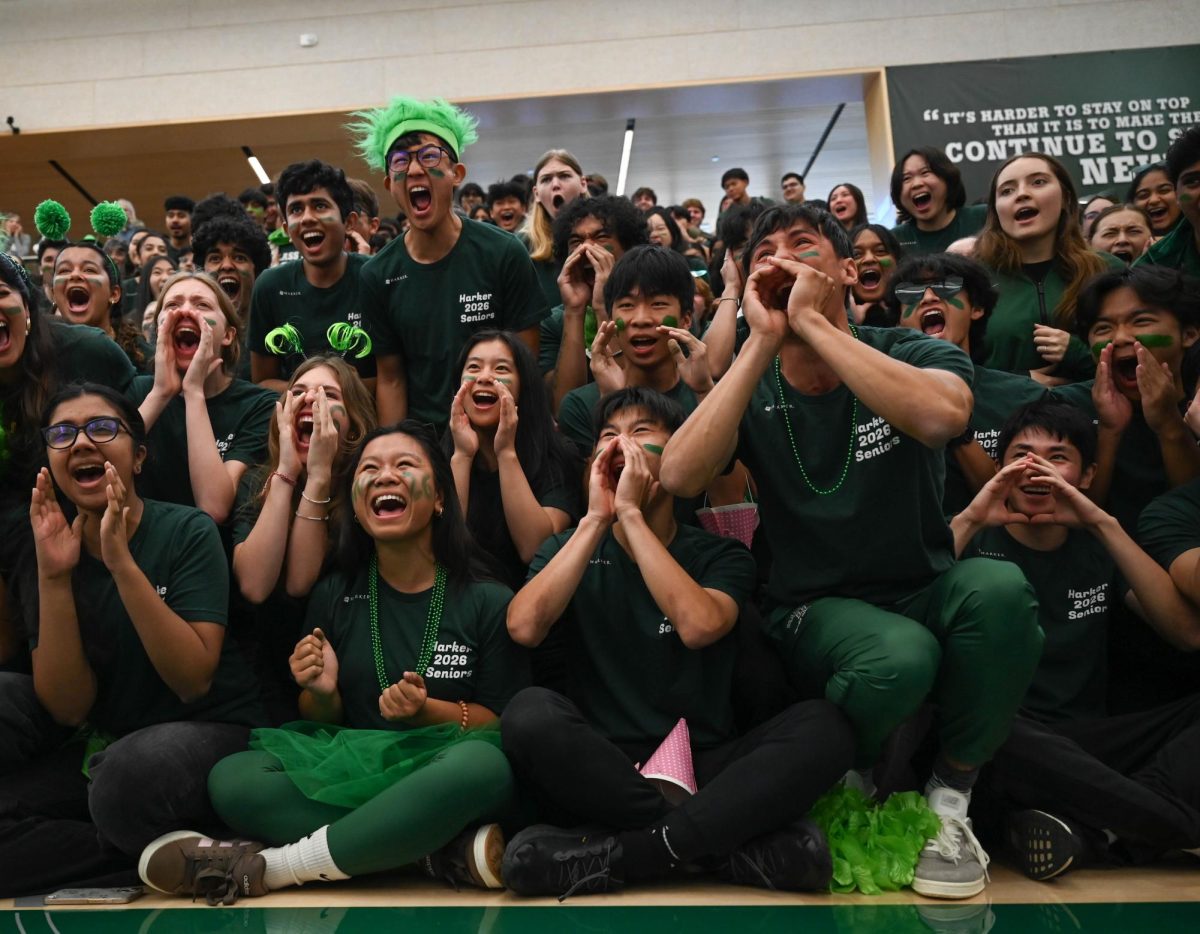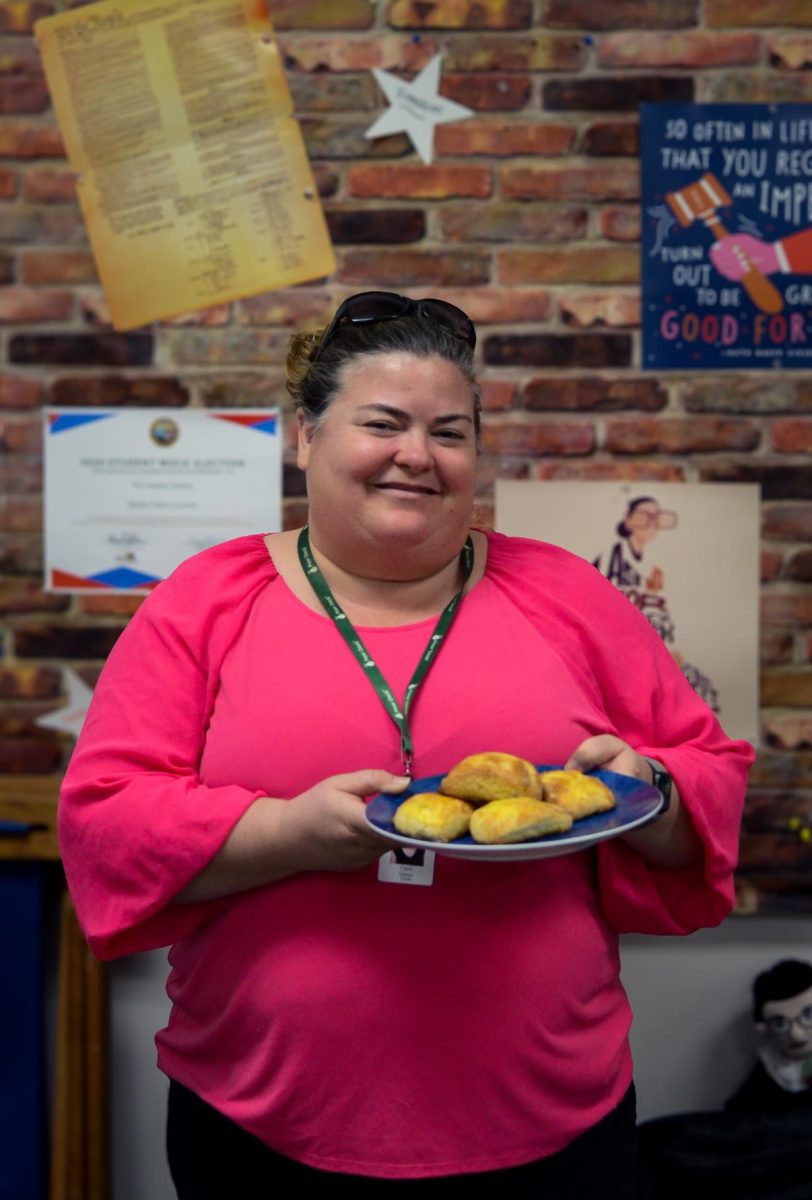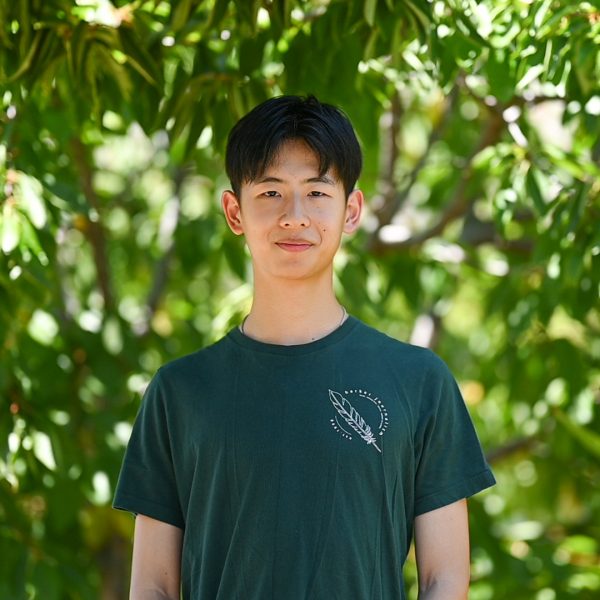Strolling the downstairs Shah lobby, a teacher suddenly overhears the pulsing beat and smooth flow of Tupac’s most famous hits. Peering into the classroom, they see a sprawling picture of Tupac projected on the board, along with the following words in bold marker: “AP Government: Foundational Document Rap Battle.” This is senior class dean and history and social science teacher Carol Green’s second home, where she teaches and prioritizes the student experience, often incorporating unorthodox activities.
Green’s unique curriculum engages even the least outspoken students in civil discourse. She first joined Harker in 2005 as a public speaking teacher. She originally thought that teaching would be a one-year job, a gap year before applying to pursue a PhD in political science. However, she continued to teach at Harker, eventually going on to teach Civics, AP U.S. History, and AP Government.
“I’ve been in this department for nine years,” Green said. “I love the fact that I get to take my background in public speaking and argumentation combined with my passion for civics and government and share all of that with students.”
During office hours, many of Green’s students gather in her room to relax and fill coloring books, while soft 2010s music plays in the background. To maximize learning for her students, Green balances rigorous coursework with a healthy environment.
“For me, the biggest challenge in teaching is social-emotional needs along with academic needs,” Green said. “I can’t make [the lessons] so dialed down that you’re not getting the content and skills, but at the same time, if you’re overloaded, you’re not getting it either.”
Green’s thoughtful approach to teaching comes not only from her years of experience as an educator but also from her drive to constantly improve. She sees everyone around her as an opportunity to take inspiration from and remains open to input about her teaching.
“I think about myself as a student and the things that I really appreciated about the teachers I had,” Green said. “I try to pull some of the best of that and take feedback from my students each year. As [Harker Summer Institute’s] principal, I also have the opportunity during the summers to observe other teachers.”
Green’s willingness to learn from those around her also encompasses an entirely different realm: the kitchen. Every month, Green attends virtual cooking classes hosted by Truffle Shuffle, a class where Michelin-star chefs from French Laundry teach recipes for a variety of dishes over Zoom, from beef Wellington to macarons.
“During the spring break of the pandemic, I was on social media and I saw this ad for a charcuterie board class on Zoom where they would send you everything,” Green said. “I had such a blast: we got to meet and ask questions to French Laundry chefs and cheese makers about the special truffle honey they used.”
That same year, Truffle Shuffle slated a class for Mother’s Day. Since the lockdown prevented Green from visiting her mother in person, her whole family gathered on Zoom to celebrate.
“Cooking unites my family,” Green said. “It was hard to get together for events, but we were able to do a cooking class together where we all made the same gnocchi dish through Truffle Shuffle. Even though we weren’t physically together, we all sat down and ate the same meal at the same time and caught up on each other’s lives.”
To Green, food is a physical manifestation of comfort and community. Sitting down to eat a meal carries enough weight to cross both physical boundaries and the intangible barriers between teacher and student.
“Food is love,” Green said. “When you prepare a dish for someone, you are sharing a part of yourself with them, and you’re showing that you care for them. One of the reasons why I keep taking these classes is that I want to grow my skill sets to share food with my advisory. It’s a lot easier to have genuine, difficult conversations with advisees when you’ve got cookies to share.”
Green’s compassion stretches beyond her students and family. An avid cat lover and the owner of two cats, she often volunteers at Mini Cat Town, a cat shelter located in Eastridge Mall. There, she regularly gives informal talks to groups of visitors at the mall to spread awareness.
“A lot of baby kittens need around-the-clock care, especially in those first eight weeks of life,” Green said. “Most shelters don’t have the resources to take care of that. So even a no-kill shelter will put those kittens down if nobody’s there to take them at the end of the night.”
Growing up in the Central Valley, Green often witnessed people dropping off cats in the wilderness. Even in the more developed Bay Area, the persistent problem of stray cats caught the attention of Mini Cat Town.
“We just want to reduce that unwanted cat population: you’ve got cats that are not thriving, which is unfair to the cats.” Green said. “But also a lot of communities don’t want cats running around their neighborhoods, since they can kill local bird populations and other wildlife.”
Green fosters community by uplifting every individual she encounters, whether student, family member or feline. In the classroom, kitchen, and at the shelter, Green ensures that every voice truly feels heard.
“It’s important to learn about different cultures and to really connect with different people,” Green said. “That’s one of the best ways to achieve understanding. When we’re talking about civic engagement, bipartisanship, or reducing hatred, a large part of that is by learning each other’s values and cultures.”



![LALC Vice President of External Affairs Raeanne Li (11) explains the International Phonetic Alphabet to attendees. "We decided to have more fun topics this year instead of just talking about the same things every year so our older members can also [enjoy],” Raeanne said.](https://harkeraquila.com/wp-content/uploads/2025/10/DSC_4627-1200x795.jpg)



















![“[Building nerf blasters] became this outlet of creativity for me that hasn't been matched by anything else. The process [of] making a build complete to your desire is such a painstakingly difficult process, but I've had to learn from [the skills needed from] soldering to proper painting. There's so many different options for everything, if you think about it, it exists. The best part is [that] if it doesn't exist, you can build it yourself," Ishaan Parate said.](https://harkeraquila.com/wp-content/uploads/2022/08/DSC_8149-900x604.jpg)




![“When I came into high school, I was ready to be a follower. But DECA was a game changer for me. It helped me overcome my fear of public speaking, and it's played such a major role in who I've become today. To be able to successfully lead a chapter of 150 students, an officer team and be one of the upperclassmen I once really admired is something I'm [really] proud of,” Anvitha Tummala ('21) said.](https://harkeraquila.com/wp-content/uploads/2021/07/Screen-Shot-2021-07-25-at-9.50.05-AM-900x594.png)







![“I think getting up in the morning and having a sense of purpose [is exciting]. I think without a certain amount of drive, life is kind of obsolete and mundane, and I think having that every single day is what makes each day unique and kind of makes life exciting,” Neymika Jain (12) said.](https://harkeraquila.com/wp-content/uploads/2017/06/Screen-Shot-2017-06-03-at-4.54.16-PM.png)








![“My slogan is ‘slow feet, don’t eat, and I’m hungry.’ You need to run fast to get where you are–you aren't going to get those championships if you aren't fast,” Angel Cervantes (12) said. “I want to do well in school on my tests and in track and win championships for my team. I live by that, [and] I can do that anywhere: in the classroom or on the field.”](https://harkeraquila.com/wp-content/uploads/2018/06/DSC5146-900x601.jpg)
![“[Volleyball has] taught me how to fall correctly, and another thing it taught is that you don’t have to be the best at something to be good at it. If you just hit the ball in a smart way, then it still scores points and you’re good at it. You could be a background player and still make a much bigger impact on the team than you would think,” Anya Gert (’20) said.](https://harkeraquila.com/wp-content/uploads/2020/06/AnnaGert_JinTuan_HoHPhotoEdited-600x900.jpeg)

![“I'm not nearly there yet, but [my confidence has] definitely been getting better since I was pretty shy and timid coming into Harker my freshman year. I know that there's a lot of people that are really confident in what they do, and I really admire them. Everyone's so driven and that has really pushed me to kind of try to find my own place in high school and be more confident,” Alyssa Huang (’20) said.](https://harkeraquila.com/wp-content/uploads/2020/06/AlyssaHuang_EmilyChen_HoHPhoto-900x749.jpeg)





